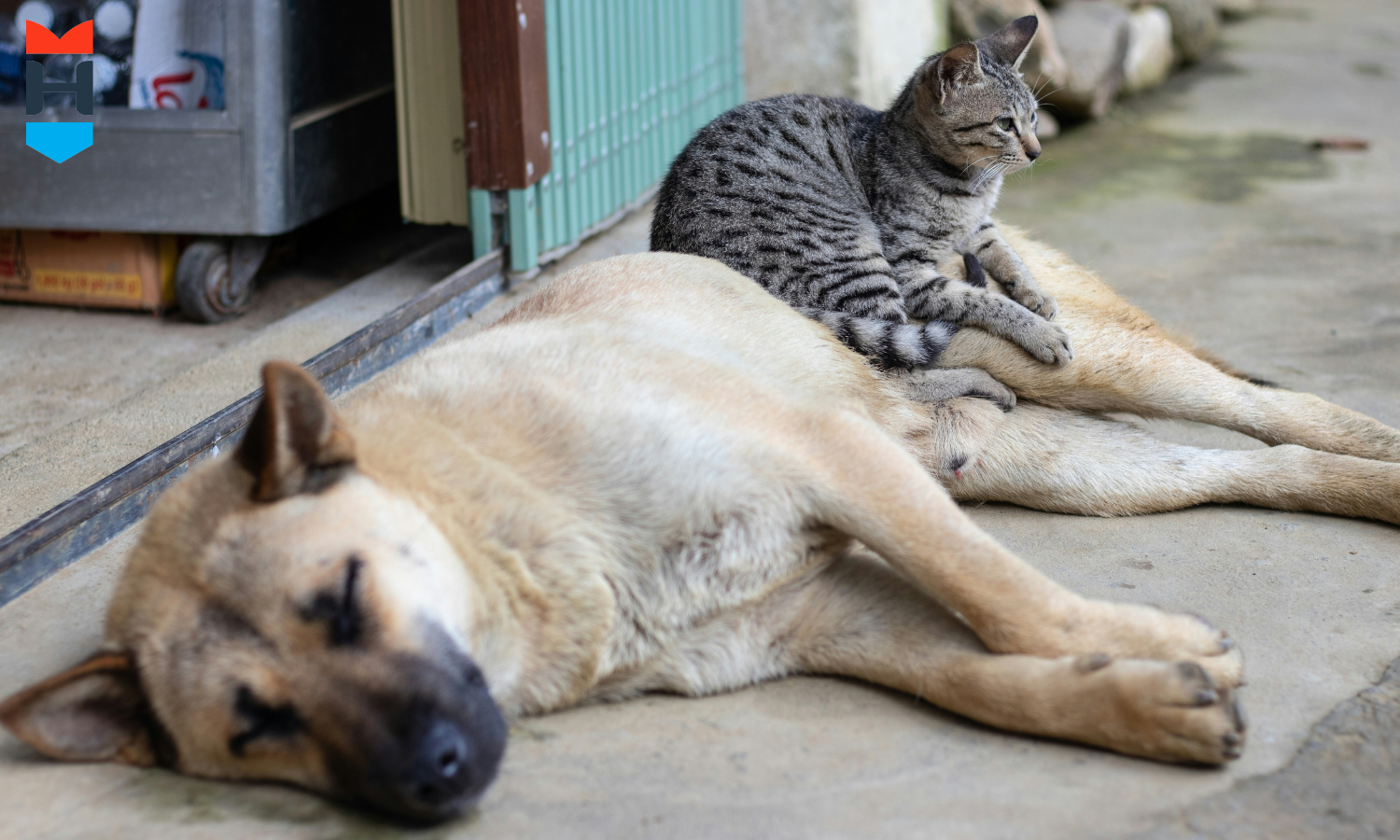Parasites such as fleas, ticks, and worms are a significant concern for pets and everyone who lives with them. They not only compromise the well-being of dogs and cats, but can also cause serious health problems—from itchy skin reactions to dangerous internal diseases.
Parasites? Not with us – how to keep pets healthy
This article is about the most common parasites, how to recognize them, what really helps, and how best to prevent them.
Additionally, we'll show how HenArt’s complete and balanced diets, utilizing plant-based and insect proteins, can support your pet’s health and help combat these issues.
Common parasites in dogs and cats – an overview
🪳 Fleas
Fleas are tiny, wingless insects that feed on the blood of their hosts. Their bites cause intense itching, leading to frequent scratching and restlessness. More importantly, fleas can transmit other parasites like tapeworms and trigger flea allergy dermatitis in sensitive animals.
🕷️ Ticks
Ticks are arachnids and attach themselves to the skin of dogs and cats to suck blood. They are not only annoying but also dangerous, as they can transmit diseases such as Lyme disease, anaplasmosis, or Rocky Mountain spotted fever. A single tick bite can have serious health consequences and, in the worst case, be life-threatening.
🪱 Worms
Worms such as roundworms, hookworms, and tapeworms are internal parasites that can cause various issues in dogs and cats. Typical symptoms include weight loss, bloating, or serious gastrointestinal distress. In some cases, these parasites can also affect humans, particularly children.
Recognizing signs of parasites
As a pet owner, it’s crucial to be vigilant for signs of parasitic infections. Here are some common symptoms:
🪳 Flea infestation
Your pet is scratching excessively, its skin is red, or you find flea dirt (small black spots) in its fur.
🕷️ Tick bites
Ticks can attach themselves to your pet's fur, especially in places like the ears, neck, or between the toes. Also watch for signs of lethargy, fever, or loss of appetite.
🪱 Worm infestation
Typical signs include visible worms in the stool, weight loss despite normal appetite, a bloated stomach, or increased fatigue.
If you notice any of these symptoms in your pet, you should definitely consult a veterinarian for an accurate diagnosis and to develop the right treatment plan.
Treatment options for parasites
🪳Fighting fleas
Treating fleas usually requires a combination of approaches, including topical treatments, oral medications, and environmental control. Here are the most common methods:
Topical treatments
Products applied directly to your pet's skin kill fleas on contact.
Oral medications
These medications work systemically to control fleas and prevent future infestation.
Environmental control
Regularly vacuuming and cleaning of your home and treating your garden will help eliminate flea eggs and larvae.
🕷️ Prevent and properly remove ticks
Tick prevention is crucial, as treatment can be complex once a tick is attached. Here’s how to manage ticks:
Tick preventatives
Monthly topical treatments or special collars help repel ticks.
Manual removal
If you find a tick, carefully remove it with fine-tipped tweezers, making sure to grab the entire tick.
Veterinary care
If your pet shows symptoms after a tick bite, it is important to see a veterinarian for proper testing and treatment.
🪱 Treating worm infestation
Deworming treatments often consist of special deworming medications. Here are the key steps for treating a worm infestation:
Deworming medication
Depending on the type of worm that has infested your pet, your veterinarian can prescribe the appropriate medication.
Regular stool examinations
Routine examinations and stool analyses help to detect worm infestations early and treat them effectively.
Effectively prevent parasites
Prevention is the best way to avoid parasite infestation. Here are some proven methods:
Regular check-ups
Schedule routine veterinary visits to monitor your pet's health and check for parasites regularly.
Consistent preventive medication
Use flea and tick protection year-round and follow your veterinarian's deworming recommendations.
Clean environment
Clean your home and garden regularly to prevent parasites from living.
Healthy eating
A nutritious diet can help bolster your pet’s immune system, making it more resistant to parasites.
How HenArt helps with parasite prevention
HenArt offers high-quality pet food that supports your pet's overall health and immune system. Our balanced food, featuring innovative plant and insect proteins, is specially formulated to strengthen your pet's defenses against parasites.
Benefits of plant proteins
Nutrient-rich
Plant-based ingredients are often an excellent source of essential vitamins and minerals that boost the immune system and help fight off parasites.
Antioxidants
Many plant foods contain antioxidants that reduce inflammation and promote immune function.
Unique added value of insect proteins and mealworms
High digestibility
Insect proteins are particularly easy to digest and enable better absorption of nutrients that are crucial for a strong immune system.
Sustainability
Insect farming is environmentally friendly and provides a sustainable source of protein while also promoting your pet's overall health.
The role of the HenArt Eggshell Membrane®
Joint and bone support
The eggshell membrane (ESM) is rich in collagen and glycosaminoglycans, which are important for healthy joints and bones – especially in active animals.
Anti-inflammatory properties
The nutrients contained in ESM help reduce inflammation, thus supporting overall health and recovery.
Tissue repair
ESM promotes tissue repair, including skin, which is especially important for animals suffering from skin irritation caused by flea or tick bites.
What to do – and what not to do
Dos
✅ HenArt's Diet
Switching to HenArt’s complete and balanced diets can provide your pet with the essential nutrients needed for a strong immune system.
✅ Regular vet visits
Make sure to have routine check-ups for your pets.
✅ Preventive treatments
Follow your veterinarian's recommendations for flea, tick, and worm prevention.
✅ Monitor health
Keep an eye on any changes in behavior, appetite, or physical condition.
Don'ts
❌ Ignoring symptoms
If you notice signs of parasites, do not hesitate to consult a veterinarian.
❌ Human medicines
Do not use medications intended for humans without first consulting a veterinarian, as they may be harmful to pets.
❌ Neglecting preventive care
Don't skip regular grooming routines, as this can lead to serious health problems.
Conclusion
Parasites like fleas, ticks, and worms can pose serious threats to the health of our dogs and cats. Recognizing the signs early and implementing a proactive approach to treatment and prevention is crucial. By choosing HenArt’s innovative complete and balanced diets, enriched with plant-based and insect proteins, you’re not only investing in your pet’s nutrition but also in their ability to combat parasitic infections.
With the added benefits of HenArt's Eggshell Membrane®, our diets support overall health, enhance immune function, and contribute to your pet’s well-being. Prioritize your pet’s health today by considering HenArt’s dietary options and maintaining regular veterinary care to keep your furry friends happy and parasite-free!



Leave a comment
All comments are moderated before being published.
This site is protected by hCaptcha and the hCaptcha Privacy Policy and Terms of Service apply.